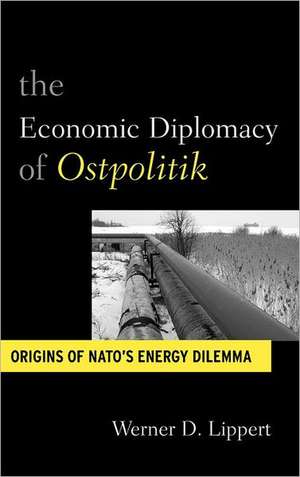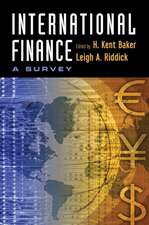The Economic Diplomacy of Ostpolitik
Autor Werner D. Lipperten Limba Engleză Hardback – 20 dec 2010
Werner D. Lippert is an Assistant Professor of History and a Fellow at the John P. Murtha Institute for Homeland Security at Indiana University of Pennsylvania. He received his Ph.D. from Vanderbilt University. His research interests include Cold War diplomacy, alliance politics, and East-West trade. He is currently working on NATO policies and international energy security in the 21st century with a particular emphasis on political dependencies caused by natural gas imports and exports.
Preț: 691.15 lei
Preț vechi: 803.67 lei
-14% Nou
Puncte Express: 1037
Preț estimativ în valută:
132.27€ • 137.58$ • 109.19£
132.27€ • 137.58$ • 109.19£
Carte disponibilă
Livrare economică 22 martie-05 aprilie
Livrare express 08-14 martie pentru 32.36 lei
Preluare comenzi: 021 569.72.76
Specificații
ISBN-13: 9781845457501
ISBN-10: 1845457501
Pagini: 260
Dimensiuni: 156 x 234 x 16 mm
Greutate: 0.54 kg
Editura: BERGHAHN BOOKS INC
ISBN-10: 1845457501
Pagini: 260
Dimensiuni: 156 x 234 x 16 mm
Greutate: 0.54 kg
Editura: BERGHAHN BOOKS INC
Cuprins
Chapter I: Detente, Trade, and the Alliance in the 1960s. 1 Pro-American Ostpolitik - nothing but East-West trade Kennedy's Use of East-West trade as a Political Tool The Busted Pipeline Deal of 1962 Johnson's Ambivalence to East-West trade Brandt's Ostpolitik is forming Chapter II: Of Honeymoons and Idealism (1968-1970) 31 Nixon's Vision of a Responsible Europe Exploring Osthandel in 1968/9 Domestic and International Dissent to a new Osthandel Nixon's concepts on East-West trade Initial Ostpolitik: Brandt's Honeymoon Period The first Gas-Pipeline Deal The Inter-German Summit Meeting: The Rude Awakening The German-American Summit on Ostpolitik in April 1970 Eastern Dilemmas with Detente Chapter III: Westhandel and the Alliance (1970-1972) 89 The Need for Soviet Westhandel Western Imports: The Kama River Plant Soviet Exports: Energy Resources The German Paradigm Shift of the Soviet Union towards a NormalA" State Using Westhandel as a Wedge in NATO Clashes within the Alliance over East-West Trade West Berlin, Trade, and the Eastern Treaties An Independent West-German Diplomacy? Chapter IV: The Origins of NATO's Energy Dilemma (1972-1974) 146 Superpower Detente Systemic Shifts in the Soviet Union Ostpolitik in the Crossfire The Brezhnev Summits in Germany and the U.S. Cementing Superpower Detente and the Middle East Crisis The Transatlantic Rift Emerges Reviving West European-Soviet Trade Chapter V: Helsinki and the Fall of Detente (1975-1982) 198 The Blessing and the Curse West Germany as the Villain Ford's Lack of Direction Jimmy Carter's Human Rights Campaign Afghanistan Crisis and Carter's Embargo Reagan's Push for Alliance Solidarity Conclusion: A Permanent Energy Dilemma for the West? 249 Bibliography 268 Notes 275












